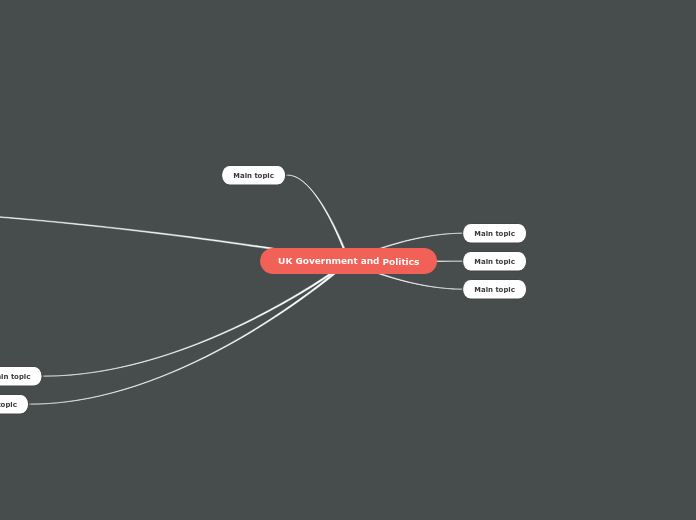UK Government and Politics
Main topic
Politics
Democracy &
Political participation
Democacy
What is Democracy?
Subtopic
Subtopic
Subtopic
Subtopic
Subtopic
Subtopic
Main topic
Main topic
Main topic
Main topic
Main topic
Federalism
The Changing federal-state relationship
Westward Expansion
Industrialisation
Improvement in communications
The Great Depression
Foreign policy
Supreme Court Justice
Constitutional amendments
Phases of federalism
Dual Federalism
Cooperative Federalism
Regulated Federalism
New Federalism
Under George W. Bush
Under Barack Obama
Key Concepts
Federalism
Limit Government
The Compromise
Consequences
Of Federalism
Legal Consequences
Policy Consequences
Consequences for Elections
Consequences for Political Party
Economic Consequences
Regionalism
The Constitution
The Nature Of The Constitution
A Codified Constitution
A constitution that consists of a full and authoritative
set of rules written down in a single text.
The American constitution consists of sevens articles which explain the relationship between the three branches of government & the various powers
A Blend of specificity & vagueness
The Constitution is specific in regards to some
powers like the power to collect taxes
Other powers are very vague like the power of congress to 'provide for the common defense and general welfare of the United States'.
Delegated Power: power given to federal government
Implied Powers : Powers inferred from the Constitution
Reserved Powers : Powers that belong to the states
Concurrent powers : Powers belonging to both state & federal
Entrenchment
The Application of extra legal safeguards to constitutional provisions to make it more difficulty to amend or abolish
Comparing the UK and US Constitution
Constitutional Rights
Principles
Separation of Powers
Checks & Balances
Amendments to the Constitution
The Bill of Rights & Later amendments
Why has the Constitution been so rarely Amended
The Amendments Process
An Amendment can be proposed by either two thirds of the House & Senate or by Legislatures in two-thirds of states calling for a national constitutional convention
An Amendment need to be ratified by either three-quarters of state legislatures or three-quarters of ratifying conventions
Only ever passed when proposed in congress (27) and almost always ratified by state legislatures (26)
Advantages of the Process
Super-majorities ensures against a small majorities imposes it will on a large minorities
Lengthy & Complicated process makes it less likely to be amended on temporary issues
Ensures both federal & states government must favour the proposal
Gives an magnified voice to the smaller states
Constitiutionals conventions called by states ensure against veto being operate by congress
